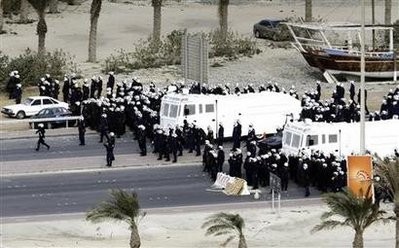The United States said Bahrain was on the "wrong track" in trying to crush Shi'ite protests in the Sunni-ruled island, rare criticism that highlighted concern the crackdown could ignite a wider regional conflict.
Bahraini forces used tanks and helicopters on Wednesday to clear a protest camp set up by youths from the Shi'ite Muslim majority which complains of discrimination by the Sunni royal family. Three police and three protesters were killed.
The unrest has brought an influx of troops to Bahrain from fellow Sunni-ruled neighbors Saudi Arabia, Qatar, Kuwait and the United Arab Emirates, who fear the uprising that began last month could play into the hands of non-Arab Shi'ite power Iran.
It has also prompted sympathy protests from Shi'ites across the region, including in Saudi Arabia's oil producing east.
Earlier this week, Washington said it understood why Bahrain's Sunni rulers had called in reinforcements. On Wednesday, Secretary of State Hillary Clinton said force was not the answer.
"We find what's happening in Bahrain alarming. We think that there is no security answer to the aspirations and demands of the demonstrators," she told CBS. "They are on the wrong track."
LIVE BULLETS, PETROL BOMBS
A medical source said dozens of people were taken to Bahrain International Hospital on Wednesday, hit by rubber bullets or shot gun pellets or suffering tear gas inhalation, all weapons used by riot police.
One was hit by a live bullet in the clash, in which youths hurled petrol bombs at police.
U.S. President Barack Obama called the kings of Saudi Arabia, a strategic ally of Washington in the Middle East, and of Bahrain, home to the U.S. Navy's Fifth Fleet and seen as a bulwark against Iranian influence, to urge "maximum" restraint.
Political analysts say the Obama administration, which gave strong support to pro-democracy protests in Egypt and Tunisia, faced a new dilemma as violence in Bahrain appeared to dash hopes for quick political talks.
U.S. Assistant Secretary of State Jeff Feltman went to Bahrain on Monday to push for talks to resolve the crisis. The U.S. State Department said on Wednesday he had already left.
Gregory Gause, a Gulf expert at the University of Vermont, said Wednesday's events showed the intent was to quash a rebellion rather than restore order to allow political dialogue to resume as Washington has urged.
Iran condemned Bahrain's response to the protests, the worst unrest there since the 1990s, and recalled its ambassador for consultations, Iranian state TV reported.
"What has happened is bad, unjustifiable and irreparable," it quoted Iranian President Mahmoud Ahmadinejad as saying.
On Tuesday Bahrain withdrew its ambassador for consultations to protest at Tehran's criticisms.
Saudi Shi'ites held several demonstrations, including one in their main regional center, Qatif, on Wednesday, demanding the release of prisoners and voicing support for Shi'ites in Bahrain, an activist and witnesses said.
"In Qatif, security shot in the air to disperse the protest," a Saudi Shi'ite activist said.
A witness said two police helicopters hovered above the demonstration. "People were demanding the withdrawal of the Peninsula force and called on Saudi Arabia to withdraw from Bahrain," the witness said, referring to Gulf states' forces.
Leading Saudi Shi'ite cleric Sheikh Hassan al-Saffar voiced dismay over events in Bahrain and a member of parliament from Bahrain's largest Shi'ite opposition group denounced the assault as a war on the Shi'ite community.
"This is war of annihilation. This does not happen even in wars and this is not acceptable," Abdel Jalil Khalil, the head of Wefaq's 18-member parliament bloc, said. "I saw them fire live rounds, in front of my own eyes."
A protest called by Bahrain's youth movement, which played a leading role in the protest camp at Pearl roundabout, failed to materialize after the military banned all gatherings and imposed a curfew from 4 p.m. to 4 a.m. across a large swathe of Manama.
A Reuters witness saw Bahraini tanks move in the direction of Budaya Street, where the protest was set to take place.
"INTERNATIONALISED"
Over 60 percent of Bahrainis are Shi'ites. Most say they want only the same treatment as Sunnis and a constitutional monarchy but calls by hardliners for the overthrow of the monarchy have alarmed Sunnis, who fear the unrest serves Iran.
Analysts say the intervention of Sunni-ruled Gulf Arab states in Bahrain might provoke a response from Tehran, which supports Shi'ite groups in Iraq and Lebanon.
"This was a major and a dangerous decision because this issue has been internationalized now. There are protests in Iraq, in Iran, in Lebanon," said Wefaq MP Jasim Hussein.
"There was no reason when our demands were local demands and nothing to do with Saudi Arabia or the United Arab Emirates."
The crackdown in Bahrain has galvanized Iraq's Shi'ite community, exacerbating sectarian tension that led to years of war in Iraq. Iraq's Shi'ite prime minister criticized the assault and Shi'ite cleric Moqtada al-Sadr called for protests.
In Lebanon, supporters of Shi'ite group Hezbollah also came out in solidarity with their fellow Shia.

The United Nations and Britain have echoed the U.S. call for restraint and the Group of Eight powers expressed concern.
"When the Gulf states now send military units to the small... island state, there is a very critical risk that the situation will... be seen as part of a broader confrontation," Swedish Foreign Minister Carl Bildt said on his blog.
"While there was most likely initially no Iranian interference, the opportunities for Iran to take advantage of the situation now undeniably grow."
Gulf expert Gause said the latest developments had given Washington a serious dilemma. "This is a really sticky situation, there is no question about that."
























